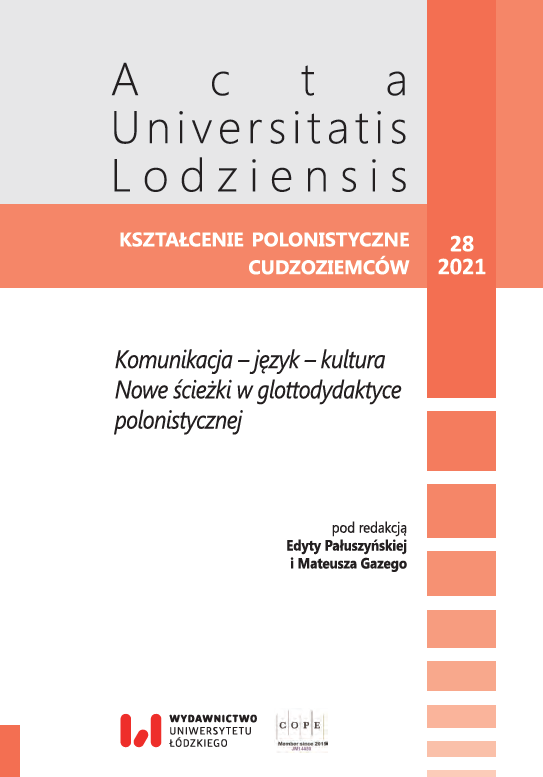The way of testing the level of mastery of the polish verb aspect in the state certificate examinations in polish as a foreign language at the B1 level in the light of new research on perfectiveness/imperfectiveness of verbs
DOI:
https://doi.org/10.18778/0860-6587.28.03Keywords:
verb aspect, certificate examinations, grammatical correctness, contextual indicator, interchangeability of aspectual partnersAbstract
The article concerns the testing of the level of mastery of the Polish verb aspect in state certificate examinations in Polish as a foreign language at the B1 level (adjusted to the needs of adults). All the tasks (from the years 2009 – 2020) devoted to the discussed grammatical category were analysed. The collected observations were compared with the conclusions drawn from the research on aspect based on Polish-German and German-Polish translation. By taking into account the perspective of cognitive semantics, this research allowed the description of the repertoire of exponents of aspectual meanings in non-aspect language, and consequently led to new findings in the field of the so-called contexts of the use of perfective and imperfective verbs in Polish – findings particularly important from the point of view of teaching Polish as a foreign language.
References
Cockiewicz W., 1992, Aspekt na tle systemu słowotwórczego polskiego czasownika i jego funkcyjne odpowiedniki w języku niemieckim, Kraków.
Google Scholar
Cockiewicz W., 2007, Na peryferiach aspektu, „LingVaria”, 2 (4), s. 9–25.
Google Scholar
Czarnecki T., 1998, Aspektualität im Polnischen und Deutschen. Bedeutungen und Formen in einer konfrontativen Übersicht, Gdańsk: Wydawnictwo Uniwersytetu Gdańskiego.
Google Scholar
Czochralski J.A., 1975, Verbalaspekt und Tempussystem im Deutschen und Polnischen. Eine konfrontative Darstellung, Warszwa.
Google Scholar
Dąbrowska A., Pasieka M., 2004, Wybrane zagadnienia morfologii czasownika jako problem glottodydaktyczny, w: M. Wojtak, M. Rzeszutko, W kręgu wiernej mowy, Lublin, s. 513–528.
Google Scholar
Dickey S.M., 2000, Parameters of Slavic Aspect: A Cognitive Approach, Stanford.
Google Scholar
Grzegorczykowa R., 1997, Nowe spojrzenie na kategorię aspektu w perspektywie semantyki kognitywnej, w: R. Grzegorczykowa, Z. Zaron (red.), Semantyczna struktura słownictwa i wypowiedzi, Warszawa, s. 25–38.
Google Scholar
Karolczuk A., 2010, Teksty, „podteksty” i konteksty a przyswajanie aspektu, „Acta Universitatis Lodziensis. Kształcenie Polonistyczne Cudzoziemców”, nr 17, s. 251–256.
Google Scholar
Koschmieder E., 1934, Nauka o aspektach czasownika polskiego w zarysie. Próba syntezy, Wilno.
Google Scholar
Lehmann V., 2010, Der slavische Aspekt im Licht der kognitiven Linguistik, w: T. Anstatt, B. Norman (red.), Die slavischen Sprachen im Licht der kognitiven Linguistik, s. 77–99.
Google Scholar
Lewiński P., 2014, Istota aspektu a nauczanie języka polskiego jako obcego, w: A. Dąbrowska, U. Dobesz (red.), 40 lat wrocławskiej glottodydaktyki polonistycznej. Teoria i praktyka, Wrocław, s. 313–329.
Google Scholar
Łaziński M., 1996, Bezokolicznik czasownika dokonanego jako człon wymagany w zdaniu, „Poradnik Językowy”, nr. 1, s. 21–29.
Google Scholar
Łaziński M., 1997, Opozycja czasowników mówić-powiedzieć w języku polskim. Analiza leksykalna i aspektowa, w: R. Grzegorczykowa, Z. Zaron (red.), Semantyczna struktura słownictwa i wypowiedzi, Warszawa, s. 121–147.
Google Scholar
Łaziński M., 2020, Wykłady o aspekcie polskiego czasownika, Warszawa.
Google Scholar
DOI: https://doi.org/10.31338/uw.9788323542346
Nadachewicz A., 2007, Kategoria aspektu w języku polskim i niemieckim. Analiza translatywna, „Investigationes Linguisticae”, vol. XV, Poznań, s. 129–152.
Google Scholar
DOI: https://doi.org/10.14746/il.2007.15.9
Piernikarski C., 1969, Typy opozycji aspektowych czasownika polskiego na tle słowiańskim. Wrocław–Warszawa–Kraków.
Google Scholar
Seretny A., 2007, Kto czyta – nie błądzi, Kraków.
Google Scholar
Śmiech W., 1986, Derywacja prefiksalna czasowników polskich, Wrocław–Warszawa–Kraków–Gdańsk.
Google Scholar
Terka B., 2018, Aspekt polskiego czasownika jako problem przekładu oraz wyzwanie dla uczących się i nauczających języka polskiego jako obcego, „Acta Universitatis Lodziensis. Kształcenie Polonistyczne Cudzoziemców”, nr 25, s. 87–95.
Google Scholar
DOI: https://doi.org/10.18778/0860-6587.25.08
Terka B., 2020, Badania kontrastywne nad aspektem polskiego czasownika a glottodydaktyka polonistyczna, w: M. Biernacka, I. Janowska (red.), Kierunki badań w glottodydaktyce polonistycznej, Kraków, s. 173–187.
Google Scholar
DOI: https://doi.org/10.12797/9788381384117.08
https://certyfikatpolski.pl/o-egzaminie/przykladowe-testy-zbiory-zadan/ (dostęp: 25.07.2021)
Google Scholar
https://certyfikatpolski.pl/wp-content/uploads/2019/09/B1_test.pdf (dostęp: 25.07.2021)
Google Scholar
https://www.infor.pl/akt-prawny/DZU.2016.061.0000405,rozporzadzenie-ministra-nauki-i-szkolnictwa-wyzszego-w-sprawie-egzaminow-z-jezyka-polskiego-jako-obcego.html (dostęp: 20.07.2021)
Google Scholar
Downloads
Published
How to Cite
Issue
Section
License

This work is licensed under a Creative Commons Attribution-NonCommercial-NoDerivatives 4.0 International License.










